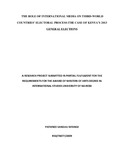| dc.description.abstract | All over the world, general election is one of the key elements in determining a countries’
leadership. This means, elections are the cornerstone of any democracy, and the media has a vital
role in informing the public about what politicians are promising, telling the politicians what
ordinary people want, or do not want, and in ensuring that the polls are “free and fair”.
Therefore, both local and international media are useful tools especially when a country gears
towards general elections. The effect of Globalization over the years has increased international
community’s participation in strengthening democracy around the world. This is mainly as a
result of two main factors: the internal demand of countries in the process of democratization,
and the external offer of the international organizations working to promote democracy around
the world. This has led to an increased demand for many countries in the process of
democratization to involve the help of international community in organizing their electoral
processes. This study aimed at investigating the role of international media on third-world
countries electoral process and 2013 Kenya’s General Elections. It sought to identify the role
played by the international media in the Kenya’s 2013 electoral process as well as the role of
international media on electoral process in a global perspective. The data used for this study was
mainly derived from secondary and primary sources. This involved open ended interviews, indepth
information gathering and document analysis. Data collected in this procedure include
quotations, opinions and specific knowledge and background information relating to the role of
international media on third-world countries electoral process and 2013 Kenya’s general
elections. Descriptive survey method is used as the research design for this study. The findings
for this study suggest that international media in third-world countries play a huge role in the
electoral processes. The international media plays a role in determining how voters vote,
highlighting new voting rules, length of registration and campaigns as well as penalties of
election misconduct. The International media also probes and asks the hard questions; questions
that the local media are scared of, or are simply not able to ask. Despite the role played by the
international media, strategic government officials must increase the power of the international
media as a tool that can be useful in executing commands as well as an avenue for relaying
information. There is need for a legislative framework governing the international media while it
still respects media freedom and autonomy. As a direction or suggestion for further related
research on the Kenyan election conflict, an examination of the Kenyan media audience as the
primary subject of study, as opposed to the international media and government officials as this
research did, would give a bigger picture on the role of the international media. | en_US |

